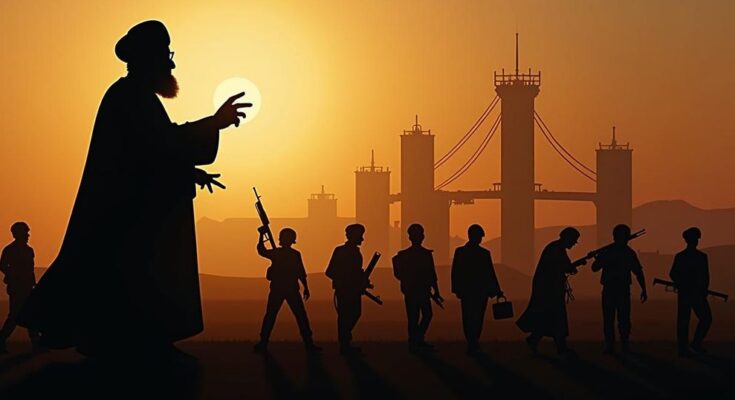Iran’s Supreme Leader Ayatollah Ali Khamenei declared that the death of Hezbollah leader Hassan Nasrallah will not go unavenged, following an Israeli airstrike that killed him. The strike raised concerns about potential escalation in the region, with calls for support for Hezbollah from Iran. The situation remains tense with possible repercussions as Iran seeks to respond while avoiding direct conflict with Israel.
In the wake of the recent death of Hassan Nasrallah, the leader of Hezbollah, Iran’s Supreme Leader Ayatollah Ali Khamenei has promised that his blood will not go unavenged. This declaration follows an Israeli airstrike in Lebanon that resulted in Nasrallah’s death. Ayatollah Khamenei expressed profound sorrow over the loss, declaring a period of five days of mourning in Iran, and characterized Nasrallah as “a path and a school of thought” that would persist despite his passing. Reports indicate that an Iranian Revolutionary Guards general was also killed in the airstrikes in Beirut. Israel’s military stated that they targeted Nasrallah due to his responsibility for numerous deaths and his role in planning additional attacks. The ongoing conflict between Israel and Hezbollah, which has escalated significantly since the attacks on October 7 and the subsequent war in Gaza, raises concerns about the potential for a wider regional conflict. The forthcoming decisions by Ayatollah Khamenei are critical in determining the trajectory of events in the Middle East. Notably, while Iranian officials have refrained from direct threats of retaliation for recent attacks, Khamenei has called upon Muslims to support Hezbollah financially and materially. He stated, “The fate of this region will be determined by the forces of resistance, with Hezbollah at the forefront.” Meanwhile, Iranian media reported heightened security for the supreme leader, emphasizing caution in the face of possible repercussions related to the strike that killed Nasrallah. The Israeli attack destroyed significant infrastructure in the southern suburbs of Beirut, where Hezbollah’s central headquarters was reportedly located. Hezbollah has confirmed the death of their leader but has yet to provide details on other casualties allegedly resulting from the strike, including Ali Karaki, who led the group’s Southern Front, and Gen. Abbas Nilforoushan, a commander in the Islamic Revolution Guard Corps (IRGC). Iran’s support for Hezbollah, through funding, training, and armament supplied by the IRGC, has enhanced the group’s military capabilities beyond those of the Lebanese army. The U.S. asserts that the IRGC is instrumental in coordinating Iran’s network of allied groups across the region, collectively known as the “Axis of Resistance,” all of whom oppose the U.S. and Israel.
This article discusses the significant political and military implications following the assassination of Hassan Nasrallah, the leader of Hezbollah, by an Israeli airstrike. The event is critical given the ongoing tensions in the Middle East, particularly between Iran, Hezbollah, and Israel. The article presents the responses from Iranian leadership indicating a resolve for retaliation, while cautioning against direct escalation. It also highlights the strategic role of Iranian military support for Hezbollah and the potential for regional conflict stemming from this incident.
In summary, the assassination of Hassan Nasrallah has prompted a strong response from Iran, with promises of vengeance that underscore the heightened tensions in the region. Ayatollah Khamenei’s calls for solidarity with Hezbollah indicate a potential escalation in hostility towards Israel, while Iran’s strategic positioning suggests a deliberate approach to avoid direct conflict. The consequences of this incident are likely to resonate throughout the Middle East, influencing both military actions and geopolitical alliances in the coming weeks.
Original Source: www.bbc.com




